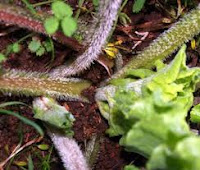OPOPONAX, SWEET MYRRH, OPOPONAX CHIRONIUM
The name opoponax comes from the ancient Greek, opos meaning vegetable juice and panax meaning a panacea or cure-all. The plant, Opoponax chironium, is native to the southern Mediterranean regions and also grows in parts of Africa , such as Somalia Kenya Iran
Opoponax is a member of the Umbelliferae plant family and as such is related to fennel, carrots, angelica, hemlock, lovage and cow parsley among others. The oleo resin extracted from cuts in the base of the stems of this plant is used in the perfume industry and has been used as incense for centuries. It is one of those Biblical resins along with balm of Gilead, True myrrh, frankincense and used along with cinnamon and cassia for its aroma. The smell of the fresh juice which is dried to form the resin is not very pleasant, but King Solomon seemed to believe that it was the best incense available to him.
The aroma is said to be reminiscent of lavender and to have a balsamic tinge to it. It has been used for centuries in the perfume industry and James Joyce, the early twentieth century novelist was familiar with it as Leopold Bloom, his main character in the epic tome “Ulysses” recognized it as an ingredient of his wife, Molly’s perfume. It also makes an appearance in Thomas Pynchon’s later work, “Against the Day” where “Plug” Loafsley’s club is said to smell of it combined with bodily smells and vervain. It makes an appearance in other novels, but these two novelists clearly knew exactly what it was, as opposed to Stephen King, who uses it rather nonsensically in one or two of his books. No doubt it is a name to conjure with, but if you use it you really should know what it is, I think.

 In times past, opoponax was used to unblock obstructions in the body in the organs and in the uterus, so was used as an emmenagogue. It was also used to cure fits of hysterics, as the aroma has a soothing effect which is said to open us up to our spiritual side. For centuries it was used to protect against evil of all kinds, and was used to cleanse and purify the spirit. It has been used to treat respiratory problems, and as an anti-spasmodic. Now, however its chief use is in the perfume industry and as incense. It is good combined with other spicy sweet smelling things such as rose, star anise, vanilla, amber, cloves, juniper, spikenard and patchouli among other things. You need about 10 grains of the resin for a potent smell. It is calming and worth smelling, even if you only try it once!
In times past, opoponax was used to unblock obstructions in the body in the organs and in the uterus, so was used as an emmenagogue. It was also used to cure fits of hysterics, as the aroma has a soothing effect which is said to open us up to our spiritual side. For centuries it was used to protect against evil of all kinds, and was used to cleanse and purify the spirit. It has been used to treat respiratory problems, and as an anti-spasmodic. Now, however its chief use is in the perfume industry and as incense. It is good combined with other spicy sweet smelling things such as rose, star anise, vanilla, amber, cloves, juniper, spikenard and patchouli among other things. You need about 10 grains of the resin for a potent smell. It is calming and worth smelling, even if you only try it once!




Stephen King uses the word "opopanax". Guess one letter makes the difference between an herb and a nonsense weird. Lol
ReplyDeleteActually, that is another name for it :)
Delete